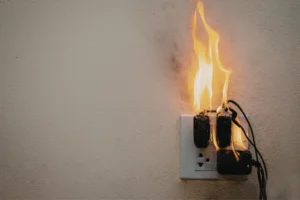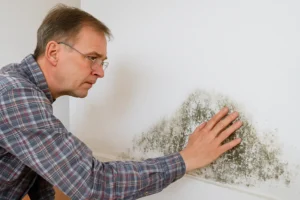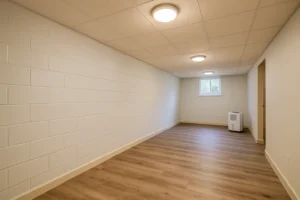When It’s Okay to DIY
In minor incidents where the water damage is minimal and contained, you might be able to handle the cleanup on your own. For instance, if you’re dealing with a spilled bucket of water or a small leak that was caught and addressed immediately, DIY cleanup could be a viable option.
Provided that you have the necessary equipment, such as fans for air circulation, a wet/dry vacuum for water extraction, and a dehumidifier to remove moisture from the air, and you are certain that the water hasn’t penetrated beneath the flooring or seeped into the walls, you may be able to effectively dry the affected area and prevent further damage.
Remember that the key to successful DIY water damage restoration is certainty. If you have any doubts about the extent of the water damage or your ability to thoroughly dry the area, it’s best to err on the side of caution and consult a professional.
Lingering moisture can lead to a host of long-term problems, including mold growth, structural damage, and health issues. These problems may not always manifest immediately, making it crucial to ensure complete drying to safeguard your property and well-being.
The Danger Lurking Behind the Walls: Mold
Mold begins to grow within 24 to 48 hours after exposure to moisture. Worse, it doesn’t need much light or air, it thrives in dark, hidden places like inside walls, under carpets, or behind cabinetry. Even if a surface looks dry, trapped moisture beneath can fuel mold growth.
How to Spot Hidden Mold
Hidden mold can be a serious health hazard, so it’s important to be able to identify the signs. Here are some indicators that you may have hidden mold:
Musty or earthy odors
One of the most common signs of hidden mold is a musty or earthy smell, particularly in areas that are closed off or have poor ventilation.
Discoloration on walls or ceilings
Mold can cause discoloration on walls and ceilings, often appearing as black, green, or brown stains.
Bubbling paint or wallpaper
Moisture from mold growth can cause paint or wallpaper to bubble and peel.
Warped flooring
If mold is growing beneath flooring, it can cause the flooring to warp or buckle.
Allergic reactions that worsen indoors
If you or your family members experience allergic reactions like sneezing, coughing, or watery eyes that worsen when you're indoors, it could be a sign of hidden mold.

Health Effects of Mold Exposure
Mold is more than just unsightly, it can seriously affect your health. Even small colonies release allergens, irritants, and in some cases, mycotoxins that are hazardous to people and pets.
Respiratory Problems
Mold exposure can cause sneezing, wheezing, coughing, and shortness of breath. Those with asthma or allergies are particularly vulnerable.
Allergic Reactions
Itchy eyes, sinus congestion, and skin rashes can result from mold allergies. Prolonged exposure may worsen symptoms over time.
Neurological Symptoms
In extreme cases, exposure to toxic mold may result in fatigue, headaches, dizziness, and trouble concentrating.
Immunological Effects
Mold can weaken your immune system over time, making you more susceptible to infections and illness.
How Mold Affects your Home
Beyond the health concerns, mold can significantly harm your property:
Drywall
Initially designed to be sturdy and resilient, drywall becomes soft and crumbly when exposed to moisture and mold. Over time, it may even disintegrate, requiring extensive repairs or complete replacement.
Wood
Wood, a staple in construction, warps, rots, and loses its strength when subjected to mold infestation. This can lead to sagging floors, weakened walls, and compromised structural supports.
Carpets and Padding
Carpets and padding act as sponges, readily absorbing water and creating a breeding ground for mold. Once contaminated, they often cannot be salvaged and must be discarded to prevent further mold growth and health risks.
Structural Supports
The structural integrity of your home can be severely compromised by mold. Wooden beams, support columns, and other critical components can weaken over time, potentially leading to safety hazards and costly repairs.
Unattended water damage quickly leads to higher restoration costs and can impact your property value if not addressed properly.
Why You Should Call a Professional
A certified water damage restoration team,like the one at Tradewinds Restoration, has the experience, tools, and technology to detect moisture in hidden areas, ensure proper drying, and prevent mold growth before it begins.
Key Advantages of Hiring Professionals to Handle Water Damage
Thorough Moisture Detection
Water can seep into hidden areas and materials, causing unseen damage. Professionals utilize advanced tools like infrared cameras and moisture meters to accurately detect moisture in walls, floors, ceilings, and other concealed spaces. This ensures that all affected areas are identified and properly dried.
Efficient and Rapid Drying
Professional-grade drying equipment, such as industrial air movers and dehumidifiers, expedite the drying process. This swift action is crucial in preventing mold growth and structural damage.
Mold Prevention and Remediation
Moisture creates an ideal environment for mold growth, which can pose health risks and cause further property damage. Professionals apply antimicrobial treatments to eliminate existing mold and prevent future growth.
Comprehensive Restoration
Beyond drying and mold prevention, professionals can handle a wide range of restoration tasks, including water extraction, debris removal, structural repairs, and content cleaning.
Insurance Claims Assistance
Professionals can document the damage, communicate with your insurance company, and assist in filing claims, potentially saving you time and hassle.
Peace of Mind
Entrusting water damage restoration to professionals provides peace of mind, knowing that the job is being handled thoroughly and effectively.
Don't Risk Your Insurance Coverage
In many cases, homeowners insurance may cover water damage restoration. However, delaying cleanup or failing to address it properly could result in denied claims, especially if mold develops due to neglect.
By acting quickly and documenting the issue with a certified restoration company, you improve your chances of full coverage and reduce long-term costs.
What’s the Verdict?
Yes, you can dry out small water spills on your own. But for anything more significant, especially where moisture may have seeped into walls or flooring, it’s always better to be safe than sorry.
- Minor surface issues? Tackle them with care.
- Hidden or widespread moisture? Call in the pros.
Call Tradewinds Restoration
Your home and health are worth protecting. If you’ve experienced water damage—no matter how small—it’s important to act fast. Our professional water damage restoration team is available 24/7 to assess, dry, and restore your home safely and efficiently.
📞 Call Tradewinds Restoration today for an expert evaluation and regain peace of mind.





